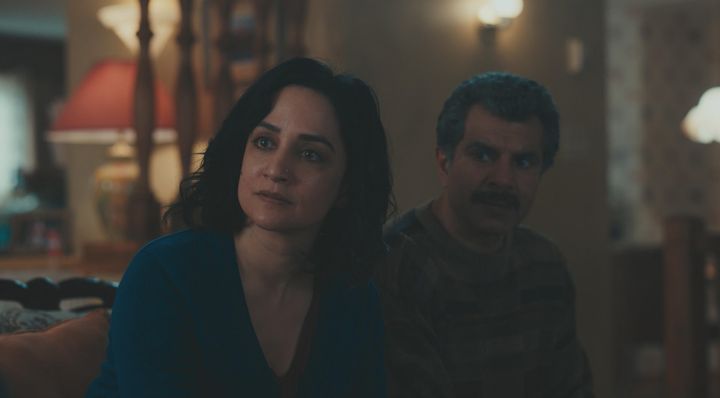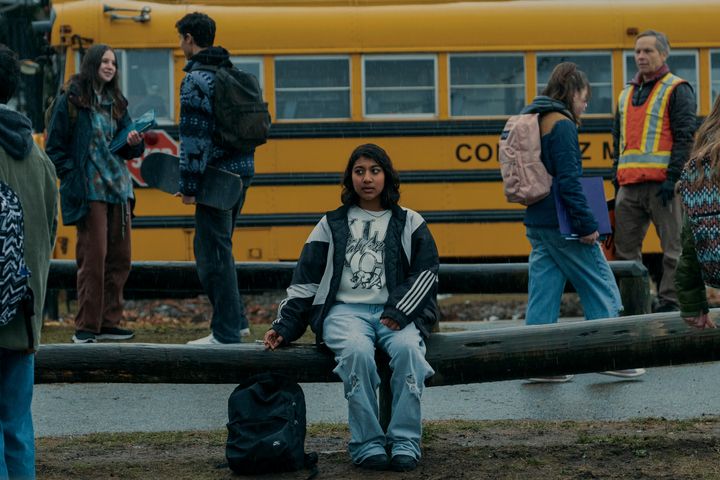Writer Rebecca Godfrey is trying to persuade the family of teenager Reena Virk to speak with her for a book she’s working on.
“I figured I could give people the opportunity to know who she was,” Rebecca (Riley Keough) tells Reena’s uncle, Raj (Anoop Desai), in the third episode of “Under the Bridge,” after a memorial service for his niece. “If you talk to me, then maybe I can get some truth out there.”
At various points in the eight-episode true crime series, Rebecca continues to insist her book intends to show Reena as who she was, not just how she died. But by the end, it’s clear that Rebecca doesn’t know much about Reena. What’s worse — the show doesn’t give the audience enough to know about her either.
Hulu’s “Under the Bridge,” which adapts the nonfiction book of the same name that real-life author Rebecca Godfrey released in 2005, valiantly attempts to reshape the true crime mold. In the fall of 1997, Reena was murdered in Saanich, British Columbia, by a group of teenagers who had viciously bullied her. Her death attracted national attention in Canada.
Through flashbacks and parallel timelines, “Under the Bridge” tries to paint a fuller portrait of who Reena was before her gruesome death. Adapted by Quinn Shephard, with TV veterans Liz Tigelaar (“Little Fires Everywhere”) and Samir Mehta (“Fear the Walking Dead”) among its executive producers, the series succeeds at untangling some of the many complex social dynamics surrounding the case, approaching the story as more of a sociological study and less of a whodunit. (Godfrey, who died just weeks before the series went into production in 2022, was involved in its development as an executive producer.)
But it doesn’t quite break the true crime mold entirely, still falling into some of the usual tropes of the genre. The series’ attempts at giving dimensionality to Reena (Vritika Gupta), her family and other key characters — particularly people of color — don’t go deep enough. Much of it, especially the show’s latter half, still ends up being about the details of Reena’s death and the stories of her horrific attackers.

Some of this is because it’s told primarily through the lens of Rebecca, a journalist and author in New York who returns to her hometown of Saanich to research a book about teen girls growing up there. She gets caught up in the attention around Reena’s death, which then becomes the focus of Rebecca’s book. Her best friend from childhood, Cam Bentland (Lily Gladstone), now a police detective in town, is one of the chief investigators on the case.
Gladstone gives one of the show’s standout performances, as does Archie Panjabi as Reena’s mother, Suman. Befitting its late ‘90s setting, the series’ needle drops — Biggie, Nirvana, Portishead and Elliott Smith — punctuate its grainy visuals and gray atmosphere.
The show tries to unfurl some of the social and cultural issues at play in the case. Reena and her family are marginalized on multiple levels: as a South Asian family in a predominantly white Canadian town, and as Jehovah’s Witnesses among mostly Sikhs in Saanich’s South Asian community. Reena is also deeply lonely and alienated, both at school and at home with her conservative parents.

When she was a kid, Cam, who is Indigenous, was adopted by a white family. As an adult, she has joined her dad, who is the town’s police chief, and her brother in the police force. Throughout the series, Cam, who is grappling with her own flawed role as a cop, is virtually the only person to point out the role of race in Reena’s murder. She’s also the only authority figure who is sympathetic to how people who look like Reena and her family are often written off and not taken seriously.
As the series goes on, Cam learns about some dark secrets surrounding her background, which bring new context to her specific reaction to Reena’s case and her misgivings as a member of law enforcement. But that discovery feels largely tossed off as the series struggles with how to navigate the character.
Meanwhile, Rebecca’s race and privilege mean that she sidesteps a lot of these questions. She, like many of the teens involved in Reena’s murder, is white. She also brings in her own biases as she becomes too close to aspects of the case. Rebecca realizes this in later episodes, which point toward the ways so many people and systems failed Reena. But the show never fully knows what to do with any of these intricacies and never fully commits to deepening them beyond these observations, as opposed to some other recent true crime shows that have reimagined the genre in fresh ways, like “True Detective: Night Country.”
Instead of a whodunit, “Under the Bridge” is more of a how-dunit, uncovering details and revelations about the circumstances of Reena’s death and what her terrible bullies did to her and said about her. It makes sense chronologically, as the episodes progress through the police investigation and, later, the court proceedings involving the assailants.

But it all comes at the expense of character development, especially in regard to Reena, who fades into the background as the series goes on.
That’s why it’s a particular gut punch when the show ends with a dedication to Reena’s memory. It’s emotional, having spent eight episodes learning about her horrific death and knowing she had her whole life ahead of her. But it’s also deflating because once the series ends, we still don’t really get to the heart of who she was — and we likely never will.
“Under the Bridge” airs Wednesdays on Hulu.
Disclaimer: The copyright of this article belongs to the original author. Reposting this article is solely for the purpose of information dissemination and does not constitute any investment advice. If there is any infringement, please contact us immediately. We will make corrections or deletions as necessary. Thank you.
